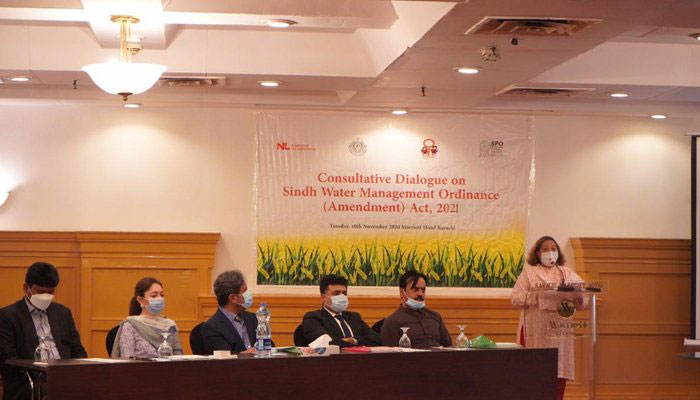‘Changes in bill to help mainstream women in water resource management’
Hailing the passage of the amendment in the Sindh Water Management Ordinance Act, women rights activists said that it will increase the women’s role in water resource management and irrigation system in the province.
On January 12, the Sindh Assembly passed the Sindh Water Management (Amendment) Bill, 2018, an amendment bill that aimed to amend certain sections of this legislation in order to provide for the empowerment of women in respect of decision- making as well as for improving their socio-economic development.
Rana Ansar, an MPA belonging to the Muttahida Qaumi Movement-Pakistan, took up this amendment to the bill. The Strengthening Participatory Organisation (SPO) and other civil society organisations had lobbied and carried out advocacy efforts to have this bill passed.
Years of action research policy dialogue resulted in the Provincial Irrigation and Drainage Authorities Act in 1997 that was replaced with the Sindh Water Management Ordinance (SWMO) 2002 and further amended as the Sindh Water Management (amendment) Act 2005.
Subsequently, autonomous institutions of irrigation management were established at different levels: Sindh Irrigation and Drainage Authority in the province were mandated to manage provincial-level irrigation affairs, while, under the entity, there were Area Water Boards (AWBs), which are responsible for the operation and maintenance of main canals. Each AWB had various tertiary-level farmer organisations (FOs), where farmers were organised into water course associations (WCAs).
Amjad Baloch, the SPO’s regional coordinator, said that women were not part of any structure such as the WCA, FOs, or AWDs despite the direct involvement of women in agriculture and water management at the local level. “It will encourage them to identify issues pertaining to water needs and make necessary decisions.”
“Now after the passage of the amendment, women will get representation in around 45,000 WCAs, over 350 FOs, and 14 AWDs,” Baloch told The News. “It helps in mainstreaming women in water resource management and irrigation structures in the province.”
He also said that the amendment had also allowed landless and peasant women farmers to become active members of water governance bodies across the province. Baloch said that after drafting the bill in 2018, the SPO had handed it over to members of the Sindh Assembly’s Women’s Parliamentary Caucus to get it passed from the provincial legislature.
Nuzhat Shirin, chairperson of the Sindh Commission on the Status of Women (SCSW), said women play a big role, from sowing seeds to harvesting crops, but there was earlier no participation of women in water resource management. “But the amendment in the bill has included women in water governance and ensured their say in decision-making bodies.”
Women have the capacity to understand and claim their role in local water governance and irrigation, she said. She appreciated all political parties in the Sindh Assembly for supporting the passage of the amendment bill and said women should participate more in every field.
-
 'Too Hard To Be Without’: Woman Testifies Against Instagram And YouTube
'Too Hard To Be Without’: Woman Testifies Against Instagram And YouTube -
 Kendall Jenner Recalls Being ‘too Stressed’: 'I Want To Focus On Myself'
Kendall Jenner Recalls Being ‘too Stressed’: 'I Want To Focus On Myself' -
 Dolly Parton Achieves Major Milestone For Children's Health Advocacy
Dolly Parton Achieves Major Milestone For Children's Health Advocacy -
 Oilers Vs Kings: Darcy Kuemper Pulled After Allowing Four Goals In Second Period
Oilers Vs Kings: Darcy Kuemper Pulled After Allowing Four Goals In Second Period -
 Calgary Weather Warning As 30cm Snow And 130 Km/h Winds Expected
Calgary Weather Warning As 30cm Snow And 130 Km/h Winds Expected -
 Maura Higgins Reveals Why She Wears Wigs On 'The Traitors' And What Her Real Hair Is Like
Maura Higgins Reveals Why She Wears Wigs On 'The Traitors' And What Her Real Hair Is Like -
 Brandi Glanville Reveals Shocking Link Of Facial Issues To Leaking Implants, Claims 'no' Support From Ex Eddie Cibrian
Brandi Glanville Reveals Shocking Link Of Facial Issues To Leaking Implants, Claims 'no' Support From Ex Eddie Cibrian -
 Who Is Rob Rausch’s Girlfriend? 'The Traitors' Winner Linked To Kansas City Woman
Who Is Rob Rausch’s Girlfriend? 'The Traitors' Winner Linked To Kansas City Woman -
 Bobby J. Brown, 'Law & Order' And 'The Wire' Actor, Dies At 62
Bobby J. Brown, 'Law & Order' And 'The Wire' Actor, Dies At 62 -
 Netflix Gives In As Paramount Offers Massive Breakup Fee To Step Away From Warner Bros. Discovery Bid
Netflix Gives In As Paramount Offers Massive Breakup Fee To Step Away From Warner Bros. Discovery Bid -
 Who Won 'Traitors' Season 4? Rob Rausch Claims $220,800 Grand Prize
Who Won 'Traitors' Season 4? Rob Rausch Claims $220,800 Grand Prize -
 Niall Horan Shares Update On New Music On The Way
Niall Horan Shares Update On New Music On The Way -
 Backstreet Boys Member Brian Littrell Refiles Trespassing Lawsuit Against Florida Retiree
Backstreet Boys Member Brian Littrell Refiles Trespassing Lawsuit Against Florida Retiree -
 Kate Middleton Dubbed ‘conscious Shopper’ By Famous Fashion Expert
Kate Middleton Dubbed ‘conscious Shopper’ By Famous Fashion Expert -
 Princess Catherine Joins Volunteers In Newtown During Powys Visit
Princess Catherine Joins Volunteers In Newtown During Powys Visit -
 Shamed Andrew Thought BBC Interview Was ‘time To Shine,’ Says Staff
Shamed Andrew Thought BBC Interview Was ‘time To Shine,’ Says Staff




